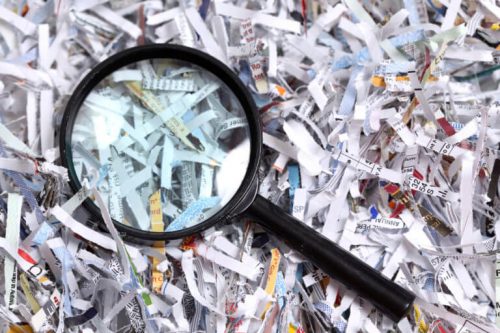Determining what documents need shredding can be difficult when beginning the shredding process. With so many different files containing all sorts of information it may seem like a daunting task separating the keepers from the soon to be shredded. Simply shredding everything isn’t always an option as some records need to be retained for a period of time. However when the time comes, it’s important to know what needs to go.
A Few Common Items
There are a lot of documents that need to be shredded, either after a specific retention period or right after they’ve served their purpose. Staying on top of your required shredding will go a long way in making the process easier and more secure. We’ll cover a few of the common items that need to go in order to help you on your way.
Tax Returns
Hopefully this item is one of those which people and businesses already take action to dispose of properly. These tend to be stored for a while for personal and banking records, but it is highly recommended that you shred the old tax return when you’ve filled out and filed your new one. If you find yourself holding on to large quantities of old tax returns, be sure to go through and shred the expired ones, and properly store any that you feel a need to hold onto.
Bank Statements
Bank statements are one of the most common items needing shredding. These records contain detailed information about your finances and banking information. It’s not uncommon to find businesses and individuals holding onto these records for one reason or another. It’s important not to keep these for too long however, as the longer they sit and the more that accumulate, the greater the risk of them getting lost or taken. Banks will have all your records on file; ensure your copies are shredded properly.
Medical Records
Medical records may seem like an odd choice; what can be done with files that say you broke your arm 5 years ago? Well for those who commit fraud using your medical records, you may find yourself getting billed for services and prescriptions you didn’t request. Having someone else’s medical issues on your file, whether real or false, can lead to doctors giving you medications or recommending treatments that you don’t need.
Hard Drives and Electronic Storage Devices
Often overlooked, are hard drives and other electronic media that really do require shredding. A lot of people believe that deleting the data is all it takes to destroy it. Sadly this is a false assumption; data retrieval software can recover deleted information. Physically destroying storage devices makes data irretrievable, so long as they have been properly destroyed.
When you’re ready to shred that back log of documents, or want to get ahead of the buildup now, feel free to contact Secure Shredding in New Jersey. We are happy to help you with this process.
Call 973-734-1911.


